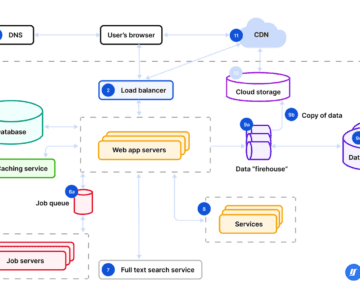Just like most industries nowadays, healthcare is rapidly undergoing a digital transformation. At the heart of this shift are mobile healthcare apps, or “mHealth.”
While general “wellness management” apps have been popular for quite some time, we’re now seeing a trend towards mHealth development for disease and treatment management. Currently, these apps represent 27% of the healthcare app sector. Their growing popularity means these apps are now reshaping our relationship with medical care.
Types of Most Popular Healthcare Apps
From managing your fitness goals to monitoring blood glucose levels, healthcare apps are bringing some burdensome health-related tasks into the home, promising more convenience and breaking down barriers.
Healthcare is a diverse sector and the apps that cater to it are typically broken down into two types:
- Professional Healthcare Apps
- Medical Apps for Patients
While there is some overlap between the two, a few significant differences are outlined below.
Wearable Technology Integration
In the world of healthcare apps, one can't overlook how wearable devices are making their mark. Picture a wristband that not only counts your steps but also keeps an eye on your heart's rhythm. These gadgets aren't just in demand, they're soaring toward a market value predicted to hit over $3.7 billion by 2025.
What does this mean for health-conscious individuals? It means instant access to vital health metrics, tailored fitness tracking, and more – all from the convenience of a device wrapped around your wrist.
Behind these advancements is the expertise of mobile app development agencies specializing in health and fitness. Their role is to develop applications that don’t merely collect data but translate it into actionable insights - helping you take charge of your wellness journey every step of the way.
Telehealth Expansion
Telehealth's growth is a noteworthy trend, especially in recent times. These services are reshaping accessibility to healthcare with telehealth applications that enable patients to have medical consultations from afar—something that 74% of millennials favor over standard face-to-face visits.
This change is in lockstep with the huge cultural changes that began with the Covid-19 pandemic such as working from home and has become popular with patients who live far from medical facilities or in communities where healthcare is sparse.
Collaborating with agencies specializing in health mobile app development ensures these platforms are solid, secure, and intuitive, aligning with the increased need for remote healthcare solutions.
Best Practices for Healthcare Mobile Application Development
Developing a successful healthcare app requires more than just innovation. You must also be committed to the industry’s best standards that ensure the app is not only functional but secure, compliant, and based on a sustainable concept.
Here are the most important best practices when it comes to developing applications used in healthcare.
User Experience Focus
When developing a healthcare app, the user experience (UX) sits right at the heart of its success. It's all about creating something that feels natural and easy to use for patients and healthcare professionals alike.
Whether it’s scheduling an appointment with just a few taps or quickly checking health stats on the go, every interaction should be smooth sailing.
Ensure Data Security and Compliance
Navigating the complex world of healthcare data demands a strong focus on security and compliance.
For mobile health apps, abiding by rules such as HIPAA in the U.S. is not just mandatory, it's absolutely central to protecting patient privacy and maintaining trust.
Security breaches can have serious consequences, both financially and for your reputation. Working with a mobile app development company versed in these regulations is crucial.
Regular Updates and Maintenance
Regular security and vendor software updates are vital for any industry, but in healthcare, they are non-negotiable.
Updates should also include software changes to comply with the latest medical guidelines, advancements in technology, and security and privacy protocols.
Continuous support ensures that your app remains functional, secure, and safe. Using a dedicated health mobile app development company means you won’t be going it alone, they’ll provide ongoing updates, address application bugs, and add new features that enhance the experience over time.
The Healthcare App Development Process
Getting healthcare app development right means adhering to a well-structured process that ensures that your app meets the needs of both patients and healthcare professionals.
Here’s an outline of the key steps involved in taking your healthcare app from concept to production:
Step 1 – Discovery and Requirement Analysis:
The initial phase in creating a healthcare application is to get to know the specific needs of doctors and patients.
It's important to dig deep into what they require, pinpoint their challenges, and figure out what they hope to achieve with this app.
Typically, companies specializing in health mobile app development take charge here. They do their homework so the features of the app meet both the users' wishes and the healthcare provider's objectives effectively.
Step 2 – Design and Prototyping:
With a solid understanding of the requirements, you move to sketch out wireframes and build prototypes that bring the app's functions to life.
This phase is key in charting the path users will take through the app, with an eye on making everything feel instinctive and smooth.
When you’ve got a health and fitness mobile app development agency on board, they apply their specialized skills to craft designs that look great while performing effortlessly. Here, you will be laying down those crucial first bricks for an engaging user experience.
Step 3 – Development and Testing:
Now that you have laid out the design, you move on to developing the app itself. This is where developers roll up their sleeves and bring the design to life through coding and incorporating key components like secure data storage, real-time monitoring, and ensuring users are who they say they are— we call it user authentication.
But creating an app isn't just about putting together lines of code. You will be putting it through its paces with thorough QA testing.
This step is to make sure everything runs smoothly when you use the app, no matter what device your users are on.
Step 4 – Deployment and Post-launch Support:
Once the development phase is wrapped up and testing confirms the app's performance, it’s time for launch.
The app makes its grand entrance on platforms such as the App Store or Google Play. But your journey doesn't stop at takeoff. To keep the app in prime condition, it requires regular updates along with continuous support to iron out any kinks, enhance features, and secure its place in a competitive market.
A dedicated health mobile app development team stands by post-launch to ensure seamless operation and ongoing application refinement.
Final words
- The landscape of healthcare is undergoing a transformative shift, thanks to the advent of app development that's tailoring patient care into something more accessible, personalized, and streamlined than ever before.
- As we look ahead, it’s clear that the trajectory for well-crafted healthcare apps is set on an upward climb, destined to redefine how health services are delivered and experienced.
- For those ready to take their concept from idea to impact, teaming up with a specialized health mobile app development company becomes pivotal. That’s where Intellectsoft steps in. We champion the fusion of high-quality care with cutting-edge technology.
- Our IT and development solutions in healthcare don’t just simplify operations, they empower informed decision-making and pave new paths for forward-thinking growth.
- Embarking on this journey toward an insight-rich, patient-focused model could be your next milestone in healthcare innovation. Discover what partnering with Intellectsoft's Healthcare Development Solutions can unlock for you today.




















